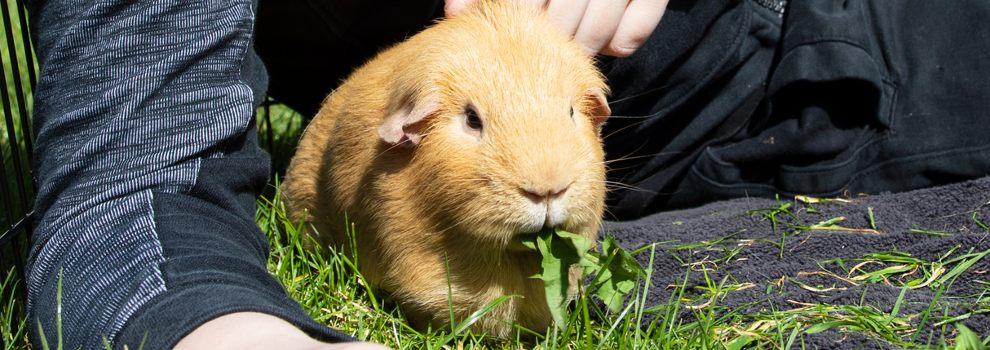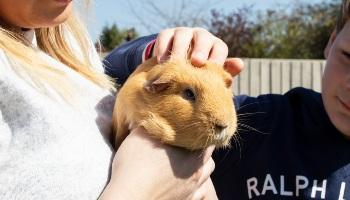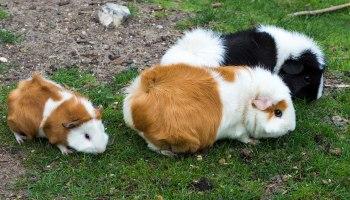Hay and grass
Good-quality hay should make up most of your guinea pigs' diet, and they should always have it available to them. They should have fresh grass as often as possible too, ideally every day. They naturally graze, eating only grass, herbs and some other plants (such as dandelion or groundsel) for long periods, both day and night. Indoor housed guinea pigs can be offered fresh growing grass in pots.
Remember, guinea pigs need hay and/or grass for their digestive systems to function properly. Also, their teeth are always growing, and eating hay helps wear them down to keep them at the correct length and shape. The wrong diet can cause serious dental disease.
Lawnmower clippings will make them ill
Never feed your guinea pigs lawnmower clippings, which will upset their digestive systems and make them ill.
Pellets
A fresh portion of grass-based guinea-pig pellets should also be available daily, as per the manufacturer’s instructions. This will provide essential Vitamin C. Vitamin C is destroyed over time and more quickly with exposure to the air so a fresh portion of pellets must be given each day – don’t just top up the bowl, and ensure the pellets are eaten by the best before date.
Your guinea pigs may need a larger portion of pellets if they're growing, pregnant, nursing or underweight. Ask your vet for advice on portion sizes if you're not sure.
Vegetables, fruits and salads
Guinea pigs need the right vegetables and leafy greens. Choose healthy options and avoid anything that may harm them.
Can eat daily
Fresh vegetables and herbs are excellent sources of vitamin C.
- Parsley
- Celery
- Peppers
- Cucumber
- Gem lettuce
-
Romaine lettuce
For example:
As a treat
These can be given in small amounts a few times a week. Their high sugar or calcium content can cause health issues.
For example:
- Broccoli
- Spinach
- Kale
- Small pieces of carrot
-
Quarter of an apple
Can't eat
For example:
- Garlic
- Avocado
- Coconut
- Citrus fruits
A few things to remember about feeding your guinea pigs
Make sure they have fresh clean drinking water continuously and check it twice daily. Ensure water doesn't freeze in winter. Without water guinea pigs become seriously ill.
- Adjust feeding quantities to prevent them from becoming underweight or overweight. The quantity of food guinea pigs need depends on their age, lifestyle and general health. They become overweight and may suffer if they're eating more than they need.
- Avoid sudden changes in their diet - introduce new foods gradually.
- Monitor the amount they eat/drink and their droppings - guinea pigs produce two dropping types - hard, dry pellets, and softer, moist pellets that they eat directly from their bottom and are essential to their diet.
Consult your vet immediately if you notice any changes in your guinea pigs' eating, drinking and/or toilet habits. For example, a sign of illness could be if their droppings stop, are less frequent or softer than usual and stick to their back. If you haven't registered with a vet, find your nearest vet practice.



